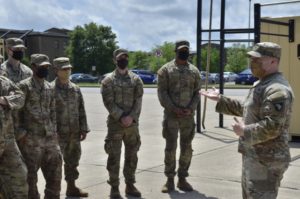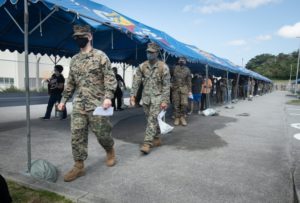
At Fort Campbell, KY, Staff Sgt. Noah Cole (right) talks about his personal COVID-19 experience recently with fellow soldiers. Having served in the Army for nine years, Cole’s future is uncertain after a severe case of novel coronavirus infection left him with likely permanent asthma, lung damage and rib pain. Photo by Ethan Steinquest
GINOWAN, JAPAN — At 0.2%, the military’s current COVID-19 mortality rate is far lower than that of the general American public, which is just under 2%. But often those who contract and survive COVID-19 have to live with its long-term effects, regardless of the severity of their acute illness.
Even effects that seem minor to the population as a whole can have potentially serious implications for military personnel, according to the authors of a review published in the September-October 2021 issue of Military Medicine.1
“The range of symptoms and physiological sequelae can impact medical readiness even in a relatively young and healthy cohort of service members,” researchers at the U.S. Naval Hospital in Okinawa wrote. “It is important to monitor, document, and investigate symptoms from all service members recovering from COVID-19. Military medicine must be prepared to support and manage cases of patients who are recovered from acute COVID-19 but are suffering from post-COVID-19 complications.”
The paper reviews the persistent symptoms in patients who have recovered from acute COVID-19 infection, grouped by body system. It also discusses the unique impact on the active duty military population.
Body system complications and possible implications were:

U.S. Marines wait in line at a COVID-19 vaccination site at Naval Hospital Okinawa, Camp Foster, in Japan earlier this year. U.S. Marines attached to Marine Rotational Force – Darwin attended a COVID-19 vaccination event at the Naval Hospital Okinawa to opt for the COVID-19 vaccine before departing to Australia. U.S. Marine Corps photo by Sgt. Micha Pierce
Neurologic. COVID-19-related neurological effects include anosmia, headaches, delirium, encephalitis, and strokes. “Although symptoms like anosmia or vertigo may be an annoyance among civilians who have recovered from acute COVID-19 infection, the impact of these neurological complications on the active duty military population cannot be overstated,” the authors wrote. “For example, chronic vertigo in a pilot or diver could result in disastrous consequences, and anosmia in a service member who is working in a closed compartment could rob them of their body’s early warning of a toxic or flammable gas leak.” Thus, they wrote, close monitoring of these persistent symptoms and consideration of their impact on a service member’s ability to execute their mission is of vital importance.
Mental Health. Of 16 papers examining the mental health of medical and frontline workers, 14 described increases in symptoms of depression, anxiety or sleep disorders among medical workers. The authors said this aspect of occupational stress and mental resilience is important to consider among military medical providers, many of whom are providing care on the front lines, far from home and their usual support systems.
Cardiovascular. Acute cardiac injury has been estimated to occur in 22% of critically ill COVID-19 patients and greater than 7% of all COVID-19 patients. In one German study of 100 participants who underwent cardiac MRI 2-3 months after COVID-19 diagnosis, 78% of all patients had evidence of heart damage on MRI and 60% had evidence of ongoing myocardial inflammation. Of those, 18% were entirely asymptomatic, and 49% had mild to moderate symptoms. These findings raise “significant for the future of the active duty military population, particularly with arrhythmia or inflammatory cardiomyopathy as a complication of COVID-19,” they wrote. “Although most military members are young and healthy and may present with mild symptoms, cardiac complications are still a risk.”
Pulmonary. COVID-19 can lead to a variety of respiratory diseases. Use of tobacco products such as cigarettes and vaping devices—reported by 18.8 percent of active duty servicemembers—may compound the effects of post-COVID-19 pulmonary disease. The researchers say the respiratory effects of COVID-19 compounded by tobacco use can have a considerable impact on the active duty population, particularly those in the dive and flight communities, as well as those stationed in areas of higher altitude or poor air quality.
Exercise intolerance. In addition to decreased aerobic exercise tolerance, persistent symptoms such as increased myalgia and arthralgia would limit a servicemember’s ability to perform physical fitness testing. This also would hinder their ability to carry gear, drag a wounded comrade off the battlefield, pursue the enemy and ultimately achieve mission success.
Research Is Ongoing
Several studies around the world are enrolling patients to study lasting post-COVID-19 sequelae.
They include:
- The Post-Hospitalisation COVID-19 Study in the UK, which will examine the long-term effects of COVID-19’s long-term effects on health of approximately 10,000 patients.
- The National Heart Blood Lung Institute’s COVID-19 Observational Study (CORAL), which will follow up on 3,000 patients from 50 hospitals after discharge to better understand the epidemiology and recovery of patients after COVID-19.
- The National Institutes of Health’s Longitudinal Study of COVID-19 Sequelae and Immunity (RECON_19), which is enrolling patients in order to better understand the long-term impacts on health of COVID-19 infection in adults.
- A COVID-19 infectious disease registry created by the Joint Trauma System (JTS) within the DoD to collect and analyze clinical data on all COVID-19 positive and suspected symptomatic cases. The goals include investigating COVID-19 risk factors and examining the safety and effectiveness of COVID-19-related treatments and outcomes. This information can be made available for performance improvement initiatives.
The list of residual COVID-19 symptoms will likely continue to grow as more data become available and the pandemic continues, the researchers wrote, explaining, “It is therefore important to monitor, document, and investigate symptoms from all service members recovering from COVID-19, since these conditions impact service members’ health and medical readiness.”
- Adams N, Sanou AZ, MC, Lewis PR, Wilson CM. Recovering Coronavirus Disease Patients in the Active Duty Military Population: A Review of Current Evidence and Special Considerations for Uniformed Providers. Mil Med. 2021 Aug 28;186(9-10):253-258. doi: 10.1093/milmed/usab241.
The authors of a recent study published in Military Medicine recommended the following when caring for patients recovered from acute COVID-19 with persistent symptoms. The benefits are to optimize patient tracking, patient outcomes, and a return to full-duty status, they said.1
Here are the recommendations in their words:
- Thorough and accurate documentation in the electronic medical record is a key. Detection and deliberate recording of what may seem to be obscure or unrelated findings may go on to impact others.
- Medicine is still medicine; work up symptoms as you normally would. Some symptoms (chest pain, dyspnea, and neurologic symptoms) are more concerning than others and require timely attention.
- Early management of patient expectations during encounters is essential. Explain that a work-up will be conducted, but there is a possibility that some symptoms may persist for months or longer. Explain to patients that data are still evolving and that we may have a better understanding of what is happening to them in the near future. If there is interest, consider encouraging them to enroll in clinical trials.
- We have a large population of young active duty servicemembers. They may want to return to previous extreme exercise routines or training, but their body may resist because of persistent fatigue from one or many of the sequelae discussed here. A well-thought-out, graduated increase in physical activity will need to be informed by military medical providers.
- Be alert for mental health issues and substance abuse. Do not wait for your patient to bring it up; ask direct questions about stigma, mental and spiritual coping, and well-being.
- Consider establishing a local registry of patients with post-COVID-19 symptoms and/or collaborating with the existing JTS infectious disease registry.
- In the absence of dedicated ICD-10 codes to describe post-COVID-19 symptoms, coordinate with a medical coder to standardize coding at the local level to facilitate accurate longitudinal tracking of COVID-19 patients.
- A multidisciplinary approach will likely be required for some patients. The team may include but is not limited to a primary care manager, a pulmonologist, an infectious disease specialist, a neurologist, a psychiatrist, a physiatrist, physical therapists, and an occupational therapist. Specialists should rule out life-threatening or urgent conditions and provide clear instructions for management. Dedicated clinics or multidisciplinary teams to support post-COVID-19 patient care are being created by other health systems. Adaptation of these paradigms to our military health system may serve as unified support to thoroughly evaluate and support returning active component military members to duty.

